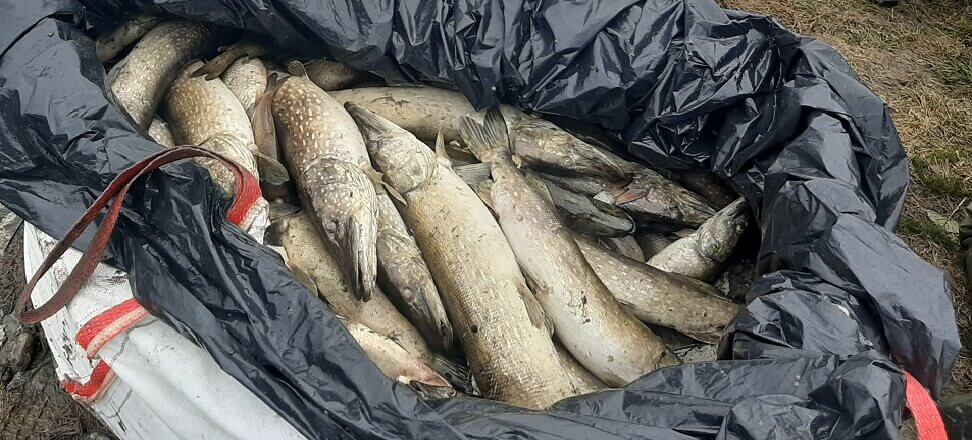In 2022. The Oder River has been hit by an ecological disaster on an unprecedented scale, with fish, mussels and aquatic snails dying en masse on hundreds of kilometers of the river and its tributaries. This situation, considered one of the biggest environmental disasters in the history of European rivers, had a huge impact not only on the environment, but also on the local economy. A press conference was held today at the headquarters of the Supreme Audit Office (NIK) in Warsaw.
This event is an opportunity to present the results from the inspection of the activities of public entities in connection with the situation, which was an environmental crisis on the Oder River. The meeting with journalists was attended by Marian Banaś, president of the Supreme Chamber of Control, Iwona Zyman, director of the NIK Delegation in Opole, and Janusz Madej, deputy director of the Delegation. An analysis of the situation on the Oder River was presented, and the errors and omissions of state bodies that contributed to the escalation of the crisis were discussed.
The environmental crisis on the Oder River is one of the biggest environmental disasters in the recent history of European rivers
At least 350 tons of poisoned fish have been caught from the Oder River and its tributaries, including 250 tons in Poland. However, scientists estimate that the actual losses may have been as much as two to three times greater, reaching 1,000 tons of dead fish and causing extinctions of up to 80 percent. organisms responsible for self-purification of the river. The discrepancies in the data summarizing the ecological crisis on the Oder River are due to the fact that the fish initially collected by anglers and volunteers were not weighed, and many of them, especially the smaller ones, settled to the bottom of the river, decomposing. This phenomenon has further reduced the oxygenation level of the water, contributing to a further increase in the mortality of aquatic organisms in the lower Oder River.
Purpose of the inspection
The purpose of the NIK audit was to assess the regularity and effectiveness of the actions taken by public entities to deal with the 2022 environmental crisis. Two areas came under scrutiny: the preparation of state structures, and the response to the situation. The 20 entities audited were: Government Crisis Management Team, Government Security Center, Ministries of Infrastructure, Climate and Environment and Interior and Administration, Inspectorate for Environmental Protection (GIOŚ and WIOŚ), State Water Management Wody Polskie (KZGW, RZGW) and provincial offices. “Overall assessment: negative,” – Iwona Zyman. The environmental crisis on the Oder River has shown the lack of preparedness of these institutions to deal with a difficult and unexpected situation.
In the first phase of the crisis, the state’s security organs showed a lack of activity. Crisis management structures have not been activated, and coordinated actions have been implemented late.
As early as July 14, 2022. There were alarming reports of massive fish die-offs in the Gliwice Canal and later on the Oder River, but regional and national authorities did not treat them with due seriousness. The information was also not provided to the Government Security Center (RCB). It wasn’t until August 10, after a call from an individual and media reports, that the RCB began coordinating efforts.
Delaying the removal of dead fish from the river has led to secondary pollution and a drop in oxygen levels in the water, resulting in the death of more of its inhabitants. The environmental crisis on the Oder River has particularly affected areas of the West Pomeranian province. The NIK stresses that “the lack of proper circulation of information resulted in the Government Security Center not issuing warning alerts to the population about the threat until August 12, 2022, at least several days late. Also, governors were late in imposing the first bans on the use of the Oder River.”
The Supreme Audit Office also notes that Poland has failed to meet its international obligations to inform the Czech Republic and Germany about the situation on the Oder, which has had a negative impact on the country’s image. “According to the rules of the agreement concluded in 1996, the situation on the Oder should have been immediately reported to our neighbors, i.e. the Czech Republic and Germany, so that these countries could prepare properly for the danger in the river. Meanwhile, warnings to Germany were already sent after earlier alarming signals were received from Frankfurt on the Oder.”
Environmental crisis on the Oder River – unpreparedness of the crisis management system
The National Disaster Management Plan, which is the most important document on the issue of managing difficult situations, did not include procedures for dealing with threats related to contamination of surface water, such as rivers. The Ministry of Infrastructure’s crisis management plan also failed to address such risks, despite the fact that as of 2018. The ministry was responsible for water administration.
It also noted that the Government Crisis Management Team, an advisory and advisory body to the Council of Ministers, has not fulfilled its tasks under crisis management regulations: “This body has not prepared a proposal for the use of forces and resources necessary to control the situation, nor has it developed any recommendations aimed at, among other things. Reducing the risk factors for the recurrence of such a threat and its consequences, in particular the extremely high level of salinity in the Oder River (chloride and sulfate pollution).”
Its actions were limited to issuing two recommendations, including one for the establishment of an inter-ministerial coordination team, which became operational on August 12, 2022. Only this mobilized the provincial governors and state services, including the State Fire Service and the Ministry of Defense, to collect dead fish in an organized manner and to exchange information on actions taken on an ongoing basis. However, there was a lack of an information system for collecting data on incidents and their progress, making it difficult to respond effectively to the environmental crisis on the Oder River. The NIK notes that “the Government Security Center was marginalized by governors and ministers during the Oder crisis. Due to the establishment of the Inter-Ministerial Team, it did not carry out the functions of the National Crisis Management Center, i.e. failed to program and coordinate the necessary activities.”
Environmental crisis on the Oder River – who is responsible for the lack of response?
The Supreme Audit Office also notes that the Minister of Infrastructure was too late in taking coordinating action. It also failed to provide monitoring of the effectiveness of the State Water Company’s work. The institution’s first Crisis Management Team meetings were not held until August 20, and the unit’s previous initiatives were not documented. The Minister of Climate and Environment and the Chief Environmental Inspector did not release the results of water quality tests in the Oder River in the early stages of the crisis. Regular environmental testing began more than two weeks late. Provincial Environmental Inspectorates initially treated fish die-offs as local events, caused by a decrease in dissolved oxygen. Extended testing of water parameters, initiated by the WIOŚ in Wroclaw, did not begin until two weeks later.
Applications
“To the Prime Minister for:
- Conducting a review and evaluation of water management arrangements to ensure effective water conservation and monitoring;
- Involving the Government Analysis Center to develop proposals for reducing salinity in water caused by mining activities;
- Introducing a nationwide system to support crisis management.
We have formulated proposals to the Minister of Infrastructure, which include, in particular, taking legislative action to:
- making an assessment of the cumulative impact of wastewater discharge by the water permit/permit issuing authorities;
- Limiting the possibility of increased water salinity resulting from regulatory changes;
- Ensure the flow of information on the results of tests and measurements of water and wastewater discharges, as well as the activities undertaken in the implementation of the Water Management Plan;
- To clarify the provisions on the agreement on the transfer of information between: The Ministry of Infrastructure, the authorities of the Inspectorate for Environmental Protection and Nature Conservation, and the State Water Company Wody Polskie”.
The situation on the Oder emphatically showed that the authorities were not prepared
The ecological crisis on the Oder River highlighted the failure of the most important public administrations in the situation to respond adequately in the first phase of the disaster – when thousands of dead fish appeared. Not only was there a lack of effective information circulation and crisis management, but warning alerts and bans on using the river were issued at least several days late.
“The Supreme Audit Office recognizes the measures taken after the Oder River disaster regarding the introduction of continuous monitoring of selected water parameters in the Oder River, the expansion of the scope of research conducted within the framework of state environmental monitoring, as well as those provided for in the law on the revitalization of the Oder River. The Chamber notes, however, that the strengthening of water monitoring is only a starting point for further measures, and those provided for in this law, given the distant time horizon for their implementation, do not reduce the risk of similar disasters in future years. Experts are even sounding the alarm that a scenario of a similar disaster is also possible on the Vistula.”

 Polski
Polski






